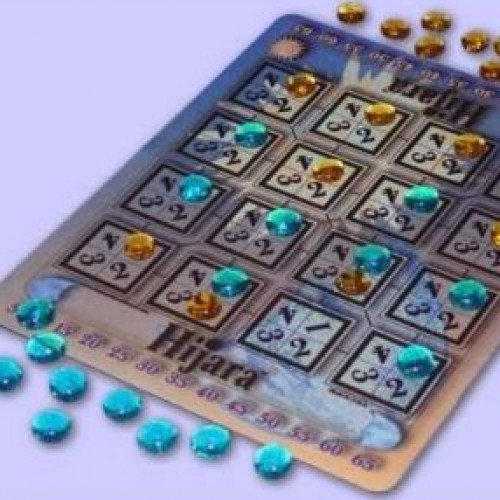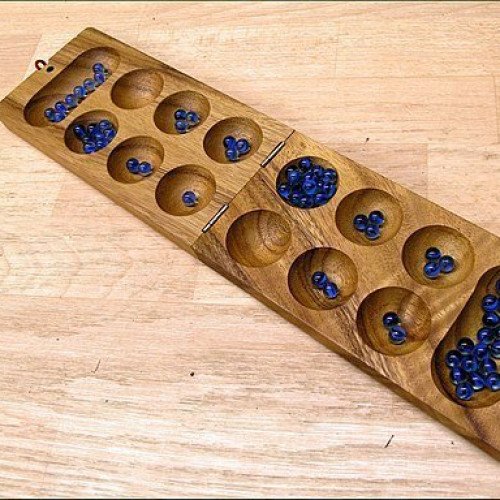HIJARA VS KALAH

HIJARA
Hijara is a two-player abstract strategy board game played with small stones. It has been likened to a three-dimensional game on a two-dimensional board. The game was designed by Martin H. Samue| and first printed, as Excel, by American Airlines in their inflight magazine, American Way, on December 24, 1985 and July 22, 1986. It has been sold commercially as Eclipse in 1994, and Hijara (the Arabic word for small stones) in 1995, 2003 and 2006. The original commercial edition of Hijara has a game board of 16 squares, divided into 4 sections numbered 1 through 4 and a score-keeping "ladder" on either end. Players choose either yellow or blue and use 32 same-color stones plus one score-keeper each. Blue starts and players take turns placing their stones, one at a time, on any square, building on those already on the board, to complete and block point-scoring combinations. When a player places a stone on a square, it must be placed in the lowest-numbered open section in that square. So, for every square, the first small stone must be placed on the 1, second on the 2, etc. The game starts with an empty board, and ends with a full board with 3 ways to score points when placement of four same-color stones is completed in any of the following combinations: 10 points - 4 stones of the same color on 4 numbers of a kind in a row - horizontally, vertically, or diagonally. 15 points - 4 stones of the same color in numerical sequence (i.e. 1-2-3-4) - horizontally, vertically, or diagonally. 20 points - 4 stones of the same color in one square. Points are won with a player's own-color stones and are always accrued, never deducted. Several point-scoring combinations may be completed at one time with a single stone. Overlooked points are forfeited and, throughout the game, players keep score on their side of the board with an extra stone of their color. The game is over when the last small stone is placed and all the numbers are covered then, by comparing accrued points totals, the player with the greater number of points is the winner of the game.
Statistics for this Xoptio

KALAH
Kalah, also called Kalaha or Mancala, is a game in the mancala family invented in the United States by William Julius Champion, Jr. in 1940. This game is sometimes also called "Kalahari", possibly by false etymology from the Kalahari desert in Namibia. As the most popular and commercially available variant of mancala in the West, Kalah is also sometimes referred to as Warri or Awari, although those names more properly refer to the game Oware. For most of its variations, Kalah is a solved game with a first-player win if both players play perfect games. The Pie rule can be used to balance the first-player's advantage. Mark Rawlings has written a computer program to extensively analyze both the "standard" version of Kalah and the "empty capture" version, which is the primary variant. The analysis was made possible by the creation of the largest endgame databases ever made for Kalah. They include the perfect play result of all 38,902,940,896 positions with 34 or fewer seeds. In 2015, for the first time ever, each of the initial moves for the standard version of Kalah(6,4) and Kalah(6,5) have been quantified: Kalah(6,4) is a proven win by 8 for the first player and Kalah(6,5) is a proven win by 10 for the first player. In addition, Kalah(6,6) with the standard rules has been proven to be at least a win by 4. Further analysis of Kalah(6,6) with the standard rules is ongoing. For the "empty capture" version, Geoffrey Irving and Jeroen Donkers (2000) proved that Kalah(6,4) is a win by 10 for the first player with perfect play, and Kalah(6,5) is a win by 12 for the first player with perfect play. Anders Carstensen (2011) proved that Kalah(6,6) was a win for the first player. Mark Rawlings (2015) has extended these "empty capture" results by fully quantifying the initial moves for Kalah(6,4), Kalah(6,5), and Kalah(6,6). With searches totaling 106 days and over 55 trillion nodes, he has proven that Kalah(6,6) is a win by 2 for the first player with perfect play. This was a surprising result, given that the "4-seed" and "5-seed" variations are wins by 10 and 12, respectively. Kalah(6,6) is extremely deep and complex when compared to the 4-seed and 5-seed variations, which can now be solved in a fraction of a second and less than a minute, respectively.